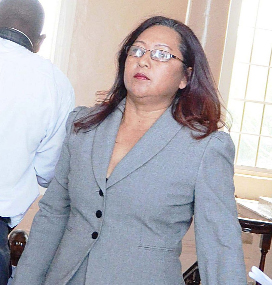Minister of Amerindian Affairs Pauline Sukhai has pledged Guyana’s solidarity with indigenous peoples in other countries in continuing the struggle for recognition, rights to land and resources and right to redress.
The Minister of Amerindian Affairs was addressing the Eleventh Session of the Permanent Forum on Indigenous Issues at the United Nations Headquarters in New York on Tuesday.

“From our country’s experience, we believe it is possible for governments to support and promote the enabling environment for the protection and promotion of indigenous people’s rights and to this end would recommend swift action during the current decade of the World’s Indigenous Peoples,” Minister Sukhai said according to a copy of her statement delivered at the forum.
And with regards to the dialogue on the Doctrine of Discovery and its enduring impact and the right to redress, Sukhai pointed out that the effects and impacts of colonialism and its concomitant dominance, dispossession and plunder have had a severe impact on countries that were victims of the system, and so no country has had a history of smooth transition from colonialism and its dominance.
She added that Guyana is a country that did not escape colonialism and its impacts with the earlier post-independence period offering little consolation in addressing indigenous peoples’ rights.
The Amerindian Affairs Minister noted that “It was against this backdrop that Guyana, a multi-ethnic society and a home to approximately 70,000 indigenous peoples, or 9.3 percent of our population, took on the challenges of ensuring that issues regarding indigenous peoples are mainstreamed into the national development priorities, thereby providing a solid platform for indigenous peoples to participate at all levels of national development and to self-govern village current and future developments.”
She said further that of the countries that endorsed the United Nations Declaration on the Rights of Indigenous Peoples (UNDRIP) to date, only some countries have exercised the political will to ensure that the principles of UNDRIP are embodied in national constitutions and legislations.
“Indigenous peoples’ rights are well entrenched in Guyana’s national constitution and are operationalized by the Amerindian Act of 2006. The Act is premised on Free, Prior and Informed consent, and provides for land rights, self-governance, sustainable utilization and management of resources and the environment among other aspects of indigenous economic and social rights and livelihood. The constitutional and legislative provisions are in many ways aligned with the UN Declaration on the Rights of Indigenous Peoples,” Sukhai told the Permanent Forum on Indigenous Issues.
She told the forum that Guyana’s indigenous population is also represented by institutions established and well placed to further foster their well-being and development in their respective communities. These include the Indigenous Peoples Commission and the Ministry of Amerindian Affairs, both of which have the mandate to propose policies on Amerindian welfare; and the National Toshaos Council (NTC), which is an independent body, comprised of elected village leaders (Toshaos) that participate in decision-making on matters affecting Amerindian villages.
Sukhai added that while indigenous peoples in some countries have been dispossessed and continue to struggle for rights to lands and resources, Guyana’s national laws allow for granting of legal titles to lands.
“It makes provision for land demarcation and extensions to strengthen tenure security. Today, Guyana’s indigenous population privately own 13.4 percent of Guyana’s land mass.”
Guyana, however, is not blinded by its progress and recognises that there is much to be done to further integrate indigenous priorities into the national development processes, Sukhai acknowledged.





